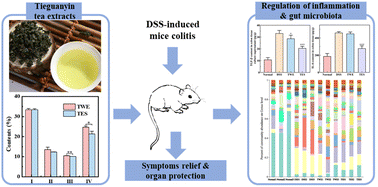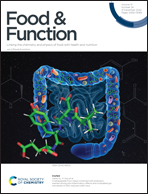Tieguanyin extracts ameliorated DSS-induced mouse colitis by suppressing inflammation and regulating intestinal microbiota†
Abstract
Previous studies have shown that a typical kind of oolong tea, Tieguanyin, has multiple health benefits, while there is no research investigating its effects on inflammatory bowel disease (IBD). In this study, we aimed to explore the alleviation effects of Tieguanyin water (TWE) and ethanol (TES) extracts on IBD. Physiological activity status, colitis severity (disease activity index (DAI), colon and spleen weight), inflammatory cytokines (interleukin (IL)-4, interferon-γ (IFN-γ), IL-17, transforming growth factor-β (TGF-β), and IL-10) and microbiota composition were measured in experimental colitis mice induced by dextran sulfate sodium (DSS). TWE and TES exerted remarkable protective effects against experimental colitis, showing decreased colitis severity and improved colon morphology. TES also suppressed colonic inflammation via downregulation of pro-inflammatory cytokines (IL-4, IFN-γ, IL-17, and TGF-β) and upregulation of the anti-inflammatory cytokine IL-10. In addition, TWE and TES treatment caused significant alterations in the gut microbiota. Oolong tea extract treatment reduced the community abundance of pernicious bacteria Escherichia–Shigella from 21.6% (DSS) to 0.9% (TES) and 1.2% (TWE), and elevated that of probiotics Lachnospiraceae_NK4A136_group from 2.2% to 15.2% (TES) and 11.9% (TWE). Therefore, TWE and TES both remarkably ameliorated DSS-induced colitis, which suggested oolong extracts could be a candidate for IBD treatment.



 Please wait while we load your content...
Please wait while we load your content...